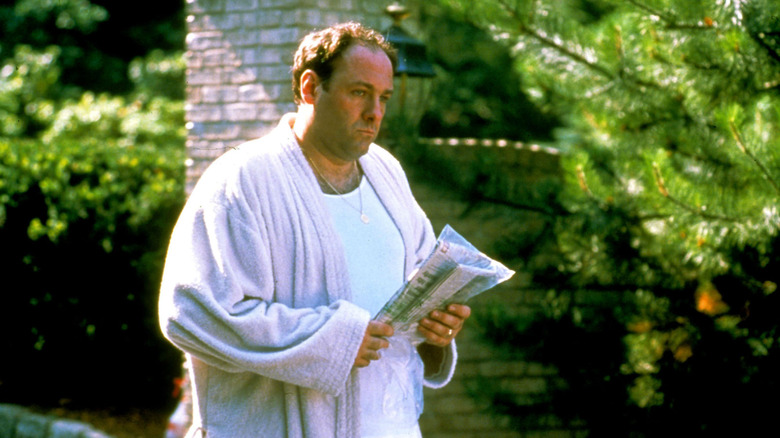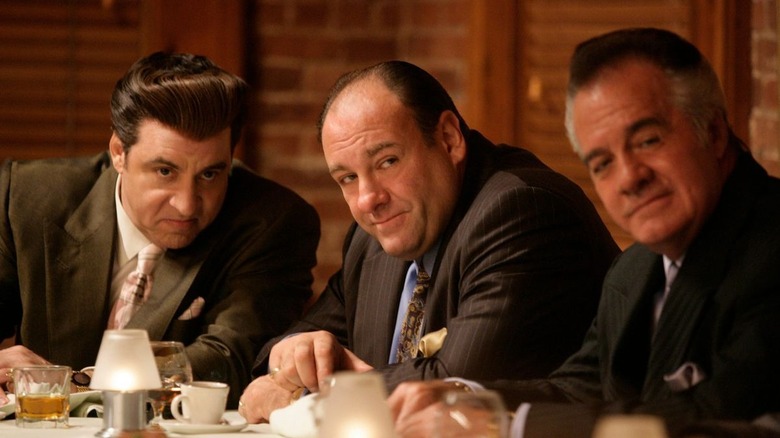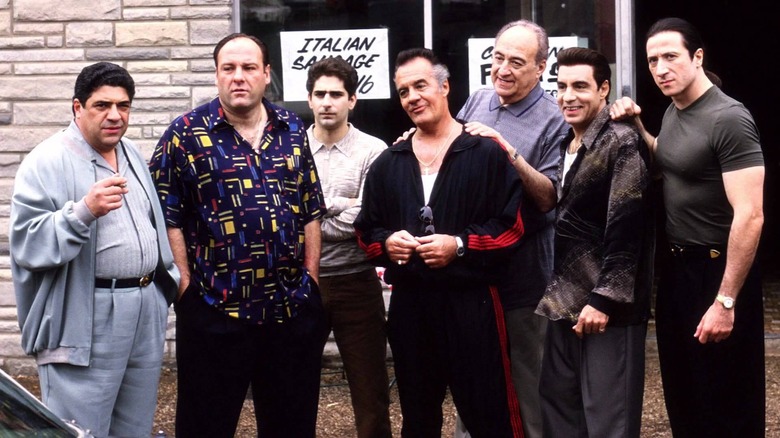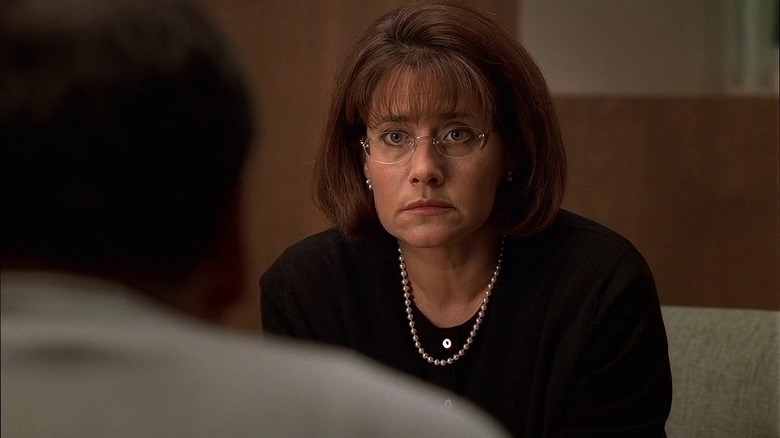Getting James Gandolfini To Even Audition Was A Struggle For The Sopranos
1999 was an interesting year for onscreen gangsters. You had Hugh Grant learning the lingo ("Fuhgeddaboudit") from James Caan in "Mickey Blue Eyes," Terence Stamp's Cockney villain seeking revenge in L.A. in "The Limey," and Robert De Niro's stressed-out mobster visiting a terrified psychiatrist in "Analyze This." They all had their moments, but nothing compared to the huge cultural impact of "The Sopranos," which jumped off from a very similar scenario to the latter and went on to become one of the greatest TV shows of all time.
I'm only 20 years late catching up with the exploits of Tony Soprano (James Gandolfini), the New Jersey mob boss juggling family problems with his wife, kids, and manipulative mother, and Family problems, as he dodges hits, weeds out rats, and avoids the Feds. No wonder the guy needs to see a therapist.
I recently committed to finally watch "The Sopranos," and now I get it. The show is a masterpiece. I'm in season 3 and I'm captivated by the writing, the music choices, and how creator David Chase interweaves multiple storylines, some of which don't pay off until many episodes later. Then you have the huge cast acing their amazing roles, all of them revolving around the immense presence of James Gandolfini. You can't imagine the show without him. Yet getting him to actually audition for the part was a tough challenge.
The perfect guy for the role... but will he show?
After starting his career on Broadway, Gandolfini found some success in movies, playing supporting parts in "Crimson Tide" and "The Juror" and giving a small but memorable performances as a sadistic gangster in "True Romance." It was this role that brought him to the attention of Chase's casting director, Susan Fitzgerald. Gandolfini loved the script, telling Vanity Fair:
"I laughed my ass off. I was like, this is really different and good, and odd. I thought, I've never been the lead before. They're gonna hire somebody else. But I knew I could do it. I have small amounts of Mr. Soprano in me. I was 35, a lunatic, a madman."
Gandolfini's first two auditions did not go well at all. David Chase recalled what went wrong (via Deadline):
"He came in and he was all huffing and puffing. He started, and then he stopped in the middle of it and said, 'I can't do this today. I can't do this. I haven't prepared right.' And he left, in the middle of the audition. And then there was a lot of negotiating and convincing, not on my part, but on the casting people's part."
There was some confusion about what was getting to Gandolfini, including a rumor involving his deceased mother. Chase continues:
"He promised to return the following Friday, and then we get word that his mother is very ill, or had died. I swear I heard this. His mother died several years ago, but I swear that's what he told me, or somebody did. And the reason I'm hesitating is because he didn't seem to me to be the kind of guy who would use his dead mother as an excuse..."
Gandolfini finally auditions for Tony Soprano
Such behavior might have lost the actor the part, but Chase believed in Gandolfini, who had shown enough talent in that disastrous first audition for Chase to offer a second chance ... and he didn't show up. Finally, Chase got Gandolfini out to his house, where it all clicked. As Chase recounted via Vanity Fair:
"What happens every time is that people come in and read, and they read and they read, and you start to think, This is really badly written, the thing sucks. And then the right person comes in, and it all works. It was pretty obvious that Jim had too much going on for this role to go with anyone else."
It's hard to imagine anyone else in the role now, but several other names were in the running – Ray Liotta and Anthony LaPaglia were both considered. Two actors who went on to have important roles in the show were also possibilities: Michael Rispoli, who played Jackie, Soprano's terminally ill boss in the first season; and Steven Van Zandt of Bruce Springsteen's E Street Band, who eventually played the key character of Silvio.
Chase's faith in Gandolfini paid off, although there was animosity between showrunner and star by the final season. As Chase said on the Happy Sad Confused podcast:
"I remember at the last party or screening or Emmy's, it was the last time we'd all be together, and we're sitting at a table, [Gandolfini] went by with his food and my wife said 'Jim, come sit over here,' and he just ignored her and sat someplace else... He started that kind of stuff, for my wife I was infuriated. I suddenly said to myself, 'I really hate that motherf*****, I hate that guy.' That's what it had come to."
Gandolfini at the heart of a great cast
Talking about the great characters and performances in "The Sopranos" runs the risk of turning this article into a list, so I'll just mention a few of my favorites. Nancy Marchand is magnificently crotchety as Livia, Tony's cunning mother, while Edie Falco brings so much warmth as his long-suffering wife, Carmella. Then you have the "Goodfellas" connection, with no fewer than 27 actors from Scorsese's mob epic also playing roles in "The Sopranos." It was one element that initially put me off when I began my watch of the series, but so far, Lorraine Bracco, Michael Imperioli, and Tony Sirico have all lived up to the hype as Soprano's shrink, protégé, and avuncular enforcer respectively.
As superb as they all are, the show hinges on Gandolfini. There are so many contrasting aspects to Tony's personality that might have turned off audiences if his performance wasn't so strong. It's a fine balancing act portraying a violent mobster and adulterer who is also an insecure and put-upon family man. It's all down to Gandolfini's skill at reconciling these elements that we see him murder a guy with his bare hands in the first season and still find ourselves rooting for him.
Gandolfini won numerous awards for playing Soprano, including a BAFTA and three Emmys, and went on to have a successful career in Hollywood until his tragic passing at the age of 51. Some of those roles were pretty good, but for many of us, he'll always be remembered as the sad-eyed gangster shuffling down his driveway to collect the newspaper in his slippers and robe.



